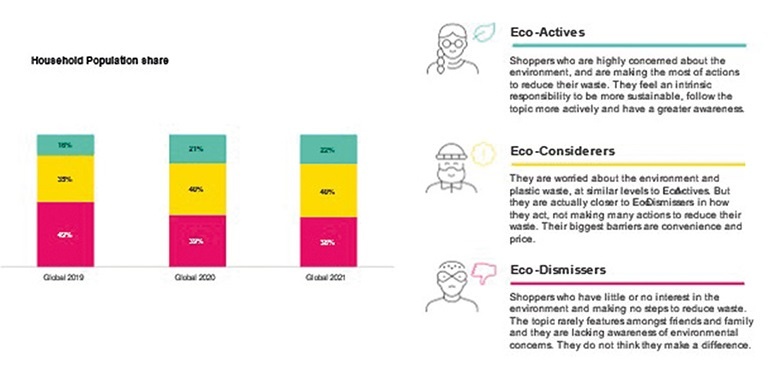Transforming consumption via rising eco-consciousness
 |
| Peter Christou, commercial director in Vietnam for Kantar’s Worldpanel Division |
Who Cares, Who Does 2021 has found that almost half of households (49 per cent) say the COVID-19 pandemic has made sustainability even more important to them. The number of households that fall in the most environmentally conscious category (which we call “Eco-Actives”) rose for the second year in a row.
Globally, this group represents nearly a quarter of consumers and is projected to grow to 40 per cent of all households over the next five years, and more than half of households by 2029. We also found that the more developed or affluent a country is, the higher percentage of Eco-Actives they have. The opposite is true in countries with low GDP per capita, with most Latin American countries and China having a relatively low share of this highly dedicated segment.
Behind the Eco-Actives, a large share of the population is trying to be more sustainable but cannot yet achieve it regularly (called “Eco-Considerers”). We believe that with the help of manufacturers, retailers, and government organisations producing more sustainable alternatives, members of this group will soon overcome barriers and find it easier to become Eco-Actives.
The study showed that the barriers to being sustainable did not differ much between the segments. Around 60 per cent of the population want to be more environmentally friendly but find it difficult because sustainable products are harder to find or more expensive, which is the biggest barrier to sustainable behaviour.
Additionally, there is a significant value-action gap across segments, which is even seen among Eco-Actives. It is the difference between peoples’ desire to be sustainable and their ability to achieve it. This gap shows a substantial unmet demand which is an excellent opportunity for companies to help shoppers close. If shoppers have more options to purchase sustainably, they will. Therefore, the responsibility – and the opportunity – lies with companies to provide more environmentally friendly options at affordable prices.
Nevertheless, the rise of the Eco-Actives group is good news for the planet and for companies that have pledged to reform their packaging and restrict their carbon footprint. The big question is how this population shift will impact brand performance. The increase of Eco-Actives will come at the expense of Eco-Dismissers, and brands that rely on this group will see their shares fall against other brands.
Indeed, over two-thirds of shoppers have switched to comparable products that have a positive impact on the environment. This rises to 85 per cent with Eco-Actives, with 48 per cent doing it frequently. There is also a large share of shoppers who have stopped purchasing a product/service with a negative impact on the environment at least once.
Hence, brands that are recognised as sustainable by shoppers will benefit in sales. In fact, within the in-home fast-moving consumer goods (FMCG) industry, the top 10 brands that over-index with Eco-Actives saw double-digit growth, performing better than FMCG as a whole and growing 2-7 times faster than average.
Furthermore, given the rising importance of sustainable development in our lives, we do witness that many more brands and players have been proactively doing good deeds over the last few years. “Planet Pledge” – a global initiative designed to galvanise action from brand owners within their membership to promote and reinforce attitudes and behaviours towards sustainability – is strong evidence of this.
This framework has attracted 17 members since its launch in April 2021, including Unilever, PepsiCo, and L’oreal. It also leads to organisational changes in many big companies where we see they create new sustainability/environmental department and related jobs, and Vietnam is no exception.
For now, with many brands already focusing on their sustainability credentials, consumers already have a perspective on which brands do a lot for society (see table).
 |
Top global consumer concerns
According to the study, climate change, water pollution, plastic waste, air pollution, and deforestation are in the top 5. Yet, the top issues differ by region. Climate change and plastic waste are the biggest concerns in both East and West Europe while the pollution issue is more important in Asia and Latin America.
To tackle the alarming issues, up to 85 per cent of shoppers intend to make at least one action to reduce their carbon footprint next year. It could be about simple actions in their daily lives like saving electricity at home, limiting water use, or taking reusable bags when shopping.
The ways brands influence consumers and key touchpoints also vary by region, even within a given region, there can be significant differences between markets. Social media is more likely to shape shopper behaviours regarding sustainability in Asia and Latin America while product packaging is more influential in Europe.
In short, the growing number of Eco-Actives, together with increasing eco-consciousness and sustainability, will result in behavioural changes towards mindful shopping and sustainable consumption. If half of the population will be Eco-Actives by 2030, there are openings for brands that embrace sustainable strategies.
Thoughts on Vietnam in 2021
Sustainability is gaining more and more attention among Vietnamese people in recent years. There is an increasing number of businesses and brands promoting sustainable development in many ways with some smart initiatives. However, Vietnam is still in the early stage of the evolution towards sustainability – which we can call the “education/inspiration” stage, since the group of Eco-Actives remains modest in the country (only 5 per cent in 2020). As such, the impact on consumer behaviours has not been clearly seen in the short term. We could expect this number will grow over time, yet the pace will be most likely slower than developed countries where there are higher GDP per capita.
Nestlé is one of the outstanding examples, promoting Vietnamese coffee and supporting local farmers and their communities with their Nescafé Plan since 2010. Another example we have witnessed is the “Refill Station” concept where people can reuse/refill their products with their own container. The Love Beauty and Planet brand from Unilever is one of the first beauty brands enabling Vietnamese consumers to do so.
One of the most noticeable initiatives that could lead to a major change and accelerate the progress of sustainability in Vietnam is the establishment of the Packaging Recycling Organization Vietnam (PRO Vietnam) in 2019, which has doubled in size to 19 members by October 2021. They are mostly leading companies in the FMCG, retail, and packaging industry with a huge consumer base, which will help raise awareness and will have a significant impact on moving Vietnamese people towards more sustainable lifestyles. The four major goals of this organisation are to spread awareness on recycling and segregation, boost the current packaging collection ecosystem, support recycling programmes, and partner with the government to recycle.
However, there are a couple of motivations and barriers that prevent Vietnamese shoppers from being more sustainable.
Motivations
- Good for health. There is a close connection between sustainable development being environmentally friendly for both physical and mental health. Yet, these benefits are hard to see in the short term, so even though many people are aware, only few really take action;
- Love to protect nature, animals, and plants;
- Desire to express themselves, being more knowledgeable;
- The spread of news and documentaries in social media could inspire or influence attitudes and behaviours towards sustainability;
- Another driving force could be the real impacts/negative impacts on our lives caused by natural disasters, environmental issues which become more and more severe, which drive people to take action.
Barriers
- The group of Eco-Actives remains small and expand slowly so its ability to influence other groups is still very limited;
- Many businesses and brands hesitate/avoid promoting sustainability activities as they might not want consumers to think it is for a commercial purpose. We need to leverage marketing and brand communications as part of the solution for sustainable development to raise awareness, to inspire and educate people and communities;
- The limited push/investment from government and local authorities in providing proper information and guidance to citizens. This is particularly poignant when we consider that despite high awareness of the positive impact recycling can have on the environment, a quarter of Vietnamese consumers say that recycling is inconvenient and there remains significant confusion around the recycling process. As it stands, Vietnam has a lot of trash to deal with and landfills are running out of space;
- As a consequence, more than half of Vietnamese households say that they are not clear about what sustainable development is, what they need to do, what activities it refers to, and what are the specific benefits/changes made by those activities, according to the study in 2020. Hence, not many people really change their behaviours even though they are aware;
- Another reason is that sustainable products/services are hard to find, not popular, and more expensive which many Vietnamese people could not afford, especially lower-income groups and in particular at this difficult time when household income and employment has been affected so badly;
- On the other hand, some actions might be potentially more inconvenient for them to take such as avoiding buying drinks in plastic bottles or products packaged in plastic.
With that being said, our recommendations to further develop sustainable living not only in Vietnam but also globally include: making sustainability a rewarding choice where people can clearly see the positive impacts they have made; making sustainability as easy as possible so they will be less distracted by other short-term benefits; and thinking beyond packaging and plastic waste.
What the stars mean:
★ Poor ★ ★ Promising ★★★ Good ★★★★ Very good ★★★★★ Exceptional
Latest News
More News
- State corporations poised to drive 2026 growth (February 03, 2026 | 13:58)
- Why high-tech talent will define Vietnam’s growth (February 02, 2026 | 10:47)
- FMCG resilience amid varying storms (February 02, 2026 | 10:00)
- Customs reforms strengthen business confidence, support trade growth (February 01, 2026 | 08:20)
- Vietnam and US to launch sixth trade negotiation round (January 30, 2026 | 15:19)
- Digital publishing emerges as key growth driver in Vietnam (January 30, 2026 | 10:59)
- EVN signs key contract for Tri An hydropower expansion (January 30, 2026 | 10:57)
- Vietnam to lead trade growth in ASEAN (January 29, 2026 | 15:08)
- Carlsberg Vietnam delivers Lunar New Year support in central region (January 28, 2026 | 17:19)
- TikTok penalised $35,000 in Vietnam for consumer protection violations (January 28, 2026 | 17:15)

 Tag:
Tag:














 Mobile Version
Mobile Version